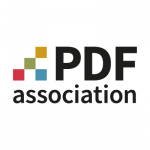
Helping government understand PDF
Governments have a special interest in PDF. The PDF Association helps them understand and address PDF technology in policies and regulations.
 The PDF Association engages in many activities as it follows its mission of promoting the adoption of ISO standardized PDF technology around the world.
The PDF Association engages in many activities as it follows its mission of promoting the adoption of ISO standardized PDF technology around the world.
Some of the most important work we do involves providing information and resources to government agencies and regulators to help them develop reference materials, guidelines, regulations and laws.
Government agencies have a special interest in PDF technology for a variety of reasons.
- The history and characteristics of PDF have made it the default format for official government documents.
- Business organizations have adopted PDF as their electronic document format of record. Most ECM and RM systems in modern companies are basically vast repositories of PDF files.
- Governments regulate documentary aspects of many businesses from litigators to pharmaceutical companies to airlines for a variety of safety, security, transparency, accessibility and other concerns. In so doing, the regulators are constantly encountering PDF files.
- Whether exchanging contracts, communicating with tax authorities or designing an invitation, end users are comfortable with PDF as a faithful representation of their intent irrespective of authoring software.
Government agencies already create, distribute, capture and retain PDF format documents on an industrial scale, and they did so long before the PDF Association came into existence. So what can we add?
How the PDF Association helps government work
From the beginning, PDF was engineered to achieve cross-platform, self-contained reliability. In other words, it was engineered to be something a community could support. Today, this reality is visible in the deep and wide range of PDF software products from thousands of vendors across the globe.
With most major PDF producers as members, the PDF Association can claim substantial representation of the industry, and the organization is undoubtedly influential. Lets review some examples:
- In 2006-2008, the PDF/A Competence Center developed the Isartor Test Suite and Application Notes to help align interpretations of PDF/A-1. This essential work made broad acceptance of PDF/A possible; the format is now a conventional, well-understood deliverable for most European government agencies.
- Starting in 2012 the PDF/UA Competence Center began work on the Matterhorn Protocol, a set of checkpoints and failure conditions for PDF/UA. Now implemented in various software, the Matterhorn Protocol is commonly referenced by accessibility experts everywhere. Unlike PDF/UA, which costs $111 bought from the PDF Association, the Matterhorn Protocol is freely downloadable from pdfa.org.
- PDF Association experts regularly advise government agencies worldwide on their policies and procedures for managing electronic documents using the PDF file format.
- PDF Association personnel have testified before government agencies in North America, Europe and Australia on various aspects of PDF technology. As a result, in part, of these efforts, PDF/UA features in the US Access Boards 2015 Notice of Public Rule-Making as the means of compliance with Section 508 for PDF content.
- The European Securities and Markets Authority, the regulatory agency developing the European Single Electronic Format specification for financial reporting, has received input from the PDF Association.
- The PDF Association helps staff at the US National Archives and Records Administration, the US Library of Congress, the US Courts and several other agencies stay up-to-date with developments in ISO standards for PDF.
- Staff of the PDF Association are currently preparing testimony to the US Department of Justice in response to its request for comment on new regulations covering content on government and commercial websites under the Americans with Disabilities Act.
The PDF Association is taking on more missions than ever before. The veraPDF project to develop an industry-accepted, open-source PDF/A validator is nearing completion based on a consensual process that began 10 years ago with the PDF/A Competence Center. veraPDF is being closely watched by government, archival and academic institutions worldwide; all indications are that interest is growing as the software and test-suite mature.
What about tomorrow?
Today, PDFs vital role as the electronic document format of record is unchallenged, but the real story is what happens tomorrow. Heres what we can look forward to:
- PDF 2.0 will spawn a set of updated subset standards designed to leverage the first post-Adobe PDF in the next-generation of archival, accessibility, engineering, raster image and other specifications based on PDF.
- Acceptance of PDF as a first class citizen of the web technology stack will spread, with developers, implementers and users increasingly leveraging PDFs capabilities throughout their workflows.
- Government will continue to expand not only its own use of PDF but will require commercial entities to meet various standards for document formats, including PDF.
PDF remains the indispensable file format for business and government because it is uniquely suited to cases where reliable, cross-platform, self-contained documents are either required or desirable. As part of its mission to drive awareness of PDFs capabilities and the value of ISO standardization of PDF technology, the PDF Association will continue to interact with and advise government and regulatory agencies worldwide as they develop policies for the management of electronic documents.




